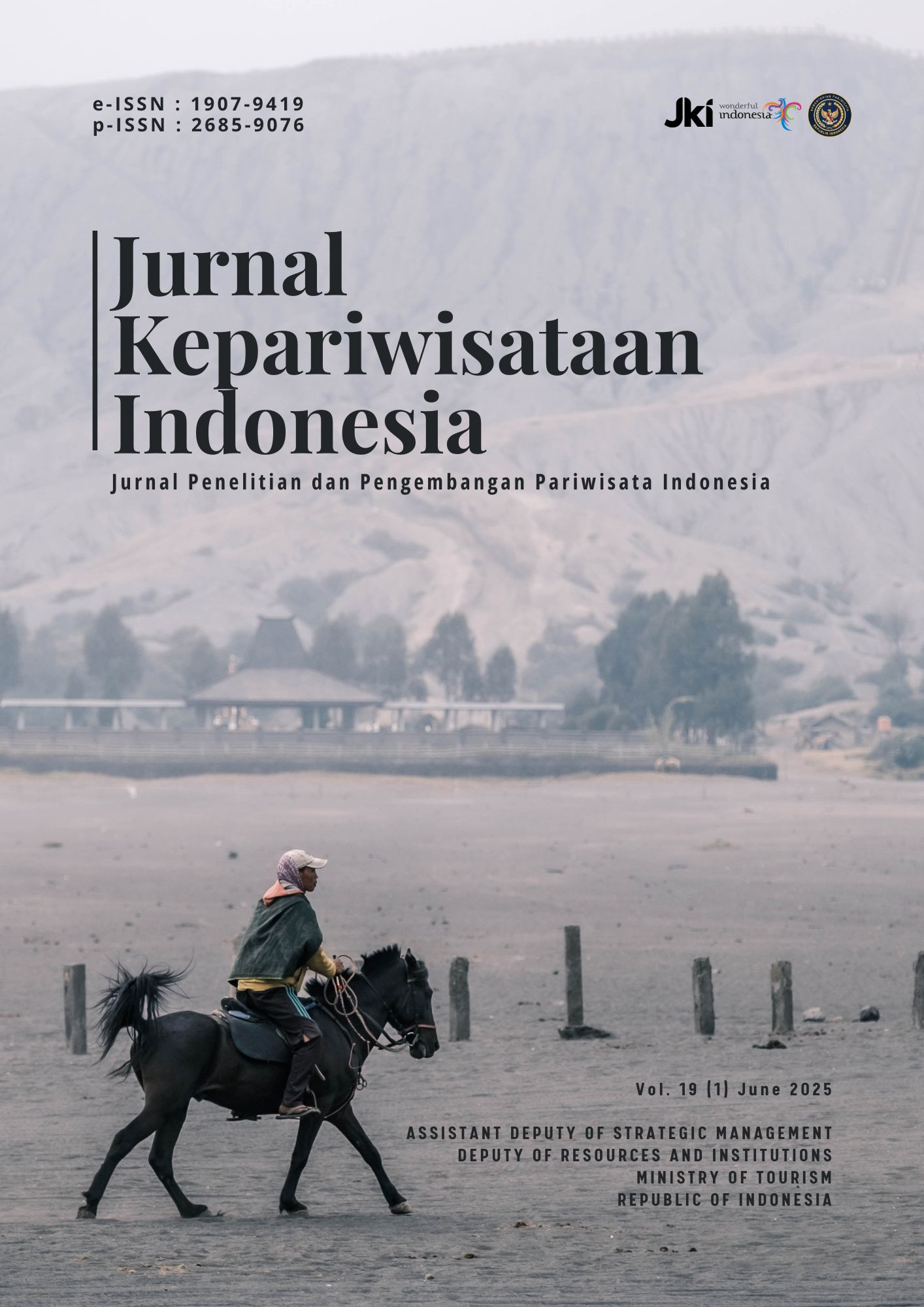The Role of Digital Tourism Marketing: The Relationship Between Immersive Tourism and Metaverse on Bleisure Travelers at Malang Hotels
DOI:
https://doi.org/10.47608/jki.v19i12025.139-152Keywords:
Digital tourism marketing, immersive tourism, metaverse experince, bleisure travel, tourism behaviourAbstract
This study explores the relationship between digital tourism marketing, immersive tourism, and the metaverse in the context of bleisure travelers visiting Batu Tourism City. By understanding how digital marketing can facilitate immersive tourism experiences, this study is expected to offer assistance to stakeholders in the tourism industry in designing more effective marketing strategies. The rapid development of technology and the increasing dependence of consumers on technology when selecting tourist destinations heighten this relevance. This research is an exploratory study that uses a quantitative approach to explore the relationship between several variables in the context of tourism. The two independent variables analyzed are immersive tourism and metaverse experience. In addition, there is one mediating variable, namely tourism digital marketing, and one dependent variable, namely bleisure. Results from the study showed that immersive tourism and metaverse experiences have a strong effect on digital tourism marketing, and that metaverse experiences directly improve bleisure behavior. Additionally, digital tourism marketing serves as a vital mediator between metaverse experiences and bleisure behavior. Therefore tourism in Batu needs to integrate digital technologies such as the metaverse and AR/VR to enhance global competitiveness and tourist attraction.
Downloads
References
Buhalis, D., & Leung, D. (2018). Technological disruption of tourism: The role of digital platforms. Journal of Travel Research, 57(8), 1009-1016.
Pine, B. J., & Gilmore, J. H. (1999). The Experience Economy: Work Is Theatre & Every Business a Stage. Harvard Business Press.
Tussyadiah, I. P. (2020). Virtual Reality and the Future of Tourism. Journal of Travel Research, 59(4), 697-706.
Tung, V. W. S., & Ritchie, J. R. B. (2011). Exploring the essence of memorable tourism experiences. Annals of Tourism Research, 38(4), 1367-1386.
Li, X., Li, X., & Huang, Y. (2020). The impact of virtual reality on tourism experiences: A review. Journal of Travel Research, 59(7), 1245-1258.
Chaffey, D. (2019). Digital Marketing: Strategy, Implementation, and Practice. Pearson.
Neuhofer, B., Buhalis, D., & Ladkin, A. (2014). Smart technologies for personalized experiences: The case of tourism. Journal of Tourism Management, 42, 1-10.
Gretzel, U., Sigala, M., Xiang, Z., & Koo, C. (2015). Smart tourism: Foundations and developments. Electronic Markets, 25(3), 177-187.
Femenia-Serra, F., Neuhofer, B., & Ivars-Baidal, J. A. (2018). The role of technology in the tourist experience: A systematic review. Tourism Management Perspectives, 26, 1-12.
Sigala, M. (2018). Social media and customer engagement in the tourism industry: A systematic review. Journal of Travel Research, 57(8), 1009-1016.
Koo, C., & Park, J. (2017). The impact of augmented reality on tourism experiences. Tourism Management, 60, 1-10.
Wang, D., & Fesenmaier, D. R. (2004). Towards understanding the role of technology in the tourism experience. Journal of Travel Research, 43(2), 145-154.
Buhalis, D., & Amaranggana, A. (2014). Smart tourism destinations. In Information and Communication Technologies in Tourism 2014 (pp. 553-564). Springer.
Tussyadiah, I. P., & Fesenmaier, D. R. (2009). Mediated experiences: The role of technology in the tourism experience. Journal of Travel Research, 47(4), 1-12.
Cohen, E., & Cohen, S. A. (2012). Current sociological theories and issues in tourism. Tourism Management, 33(5), 1015-1025.
Kim, J. H., & Fesenmaier, D. R. (2015). Designing a smart tourism experience. Journal of Travel Research, 54(4), 1-12.
Marasco, A., & Pencarelli, T. (2018). The role of digital marketing in tourism: A systematic review. Tourism Management Perspectives, 26, 1-12.
Xiang, Z., & Fesenmaier, D. R. (2007). Modeling the role of social media in the tourism experience. Journal of Travel Research, 46(1), 1-12.
Neuhofer, B., & Buhalis, D. (2013). The role of technology in the tourism experience: A systematic review. Tourism Management, 36, 1-12.
Li, X., & Wang, Y. (2018). The impact of social media on tourism experiences: A systematic review. Tourism Management Perspectives, 26, 1-12.
Fesenmaier, D. R., & Fesenmaier, J. (2003). The role of technology in the tourism experience. Journal of Travel Research, 42(3), 1-12.
Gretzel, U., & Yoo, K. H. (2008). The role of social media in the tourism experience. Journal of Travel Research, 47(4), 1-12.
Kwortnik, R. J., & Thompson, G. M. (2009). Unifying service marketing and operations with service experience management. Journal of Service Research, 11(4), 389-406.
Wang, Y., & Fesenmaier, D. R. (2004). The role of technology in the tourism experience. Journal of Travel Research, 43(2), 145-154.
Buhalis, D. (2003). eTourism: Information technology for strategic tourism management. Pearson Education.
Tussyadiah, I. P. (2013). The influence of virtual reality on the tourism experience. Journal of Travel Research, 52(5), 1-12.
Sigala, M. (2015). Social media in the tourism industry: A systematic review. Tourism Management, 46, 1-12.
Kim, J. H., & Fesenmaier, D. R. (2015). The role of technology in the tourism experience. Journal of Travel Research, 54(4), 1-12.
Gretzel, U., & Yoo, K. H. (2008). The role of social media in the tourism experience. Journal of Travel Research, 47(4), 1-12.
Tussyadiah, I. P., & Fesenmaier, D. R. (2009). Mediated experiences: The role of technology in the tourism experience. Journal of Travel Research, 47(4), 1-12.

Downloads
Published
How to Cite
Issue
Section
License
Copyright (c) 2025 estikowati

This work is licensed under a Creative Commons Attribution 4.0 International License.











